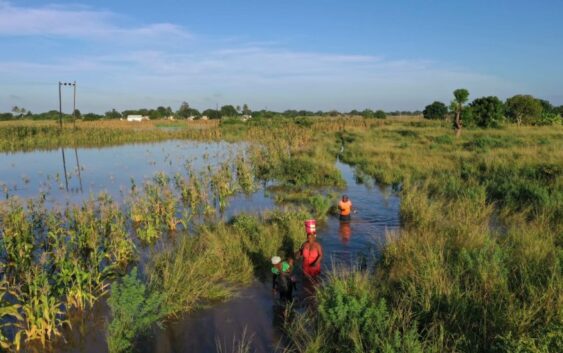- HOW TEMANE-MAPUTO ELECTRICITY TRANSMISSION LINE PROJECT IS GOING THROUGH TEST IN MOZAMBIQUE
- NEWLY OPENED PLASTIC RECYCLING PLANT SET TO HELP COMBAT NAMIBIA's PLASTIC INDUSTRY
- PROGRESS MADE ON PIIM PROJECTS AS OVER 85% COMPLETED IN ANGOLA
- WORLD BANK KICK-OFF INSPECTION OF USMID PROGRAM IN UGANDA
- ALGERIA MINISTER RECIEVED HARBOR ENERGY CEO OVER ENERGY PARTNERSHIP
EXPERTS SAYS LACK OF LAND PLANNING CAUSED FLOOD IN MOZAMBIQUE

Experts on natural disasters and land planning say that “negligence” and “lack of land planning” aggravated the impact of floods in the Maputo region, but the high “intensity” of the rain increased the effect of the calamity.
“We have not been preparing society and our institutions to deal with this type of extreme situation in the southern region,” said Luís Artur, engineer and disaster risk management specialist.
The specialist pointed out that the authorities and communities in the southern Maputo region have underestimated the impact of the floods since the area has escaped the floods and cyclones that annually devastate the Centre and north of the country.
Artur noted that the fact that the deadliest floods in southern Mozambique happened over 20 years ago, in 2000, had led to a relaxation in the region’s disaster prevention and management capacity.
The researcher and lecturer at Eduardo Mondlane University (UEM), the oldest in the country, noted that disaster prevention devices such as early warning systems, contingency plans and management committees are poorly developed in the south compared to the Centre and north, which have faced severe weather events in recent years.
“We need to boost the early warning system and better prepare communities,” he stressed.
Luís Artur pointed out the importance of better coordination with neighboring countries, where the upstream of the rivers that flow into southern Mozambique are located, in order to allow better management of flows.
It is also imperative to carry out an exhaustive mapping of flood risk areas for the identification and territorial planning of areas for resettling the people.
The engineer acknowledged that the intensity of the rainfall in Maputo would have caused damage, even in a better preparedness scenario.
Luís Lage, an architect and lecturer at the UEM, said that insufficient land planning in the Maputo region had worsened the impact of previous floods, because the floods found settlements in areas unsuitable for housing, with saturated soils, without drainage or access roads.
“Planning and infrastructure can mitigate what the rains are, the amount of water, but sometimes there are situations in which these natural phenomena are extreme, which has now occurred in Maputo,” Lage said.
The expansion of housing areas in the Maputo region, he said, had been carried out by private individuals and without compliance with legislation on territorial planning, because the state did not have the technical and financial capacity for that purpose.
“Land planning implies infrastructure,” which will allow for “the creation of access roads, access to water and power, as well as the construction of drainage ditches,” Lage said.
The architect noted that there are experiences in various parts of the world and even in Mozambique that show it is possible to build in areas prone to flooding, but these buildings have to be constructed with appropriate technology and resources.
“Part of downtown Maputo was reclaimed from the sea,” for the expansion of the country’s capital, but it did not flood, because it was built with the necessary protection, he noted.
The lecturer argued that the construction of housing and infrastructures should obey detailed plans that must be complied with, and that free will should not be allowed.
Despite pointing out deficiencies in land management, he also admitted that the Maputo region suffered from unusual and high magnitude rains in a few days, making it difficult to implement prevention and mitigation measures.
Last week, Maputo province was affected by heavy rain, which affected at least 39,000 people and caused nine deaths, as well as isolating the municipality of Boane, just over 30 kilometres from the Centre of the Mozambican capital.
Since 7 February, the southern region of Mozambique has been facing a situation of intense rain and flooding that has already caused the death of nine people and flooded 7,600 homes, causing damage to a total of 39,225 people, according to figures from the National Institute for Disaster Management.
The occurrence of floods is recurrent at this time of year in the country, which is in the middle of the rainy season, but even so, rainfall has been higher than expected.
Between October and April, Mozambique is cyclically hit by floods, a phenomenon justified by its geographical location, subject to the passage of storms and, at the same time, downstream of most of the hydrographic basins of southern Africa.
SOURCE: Club of Mozambique

